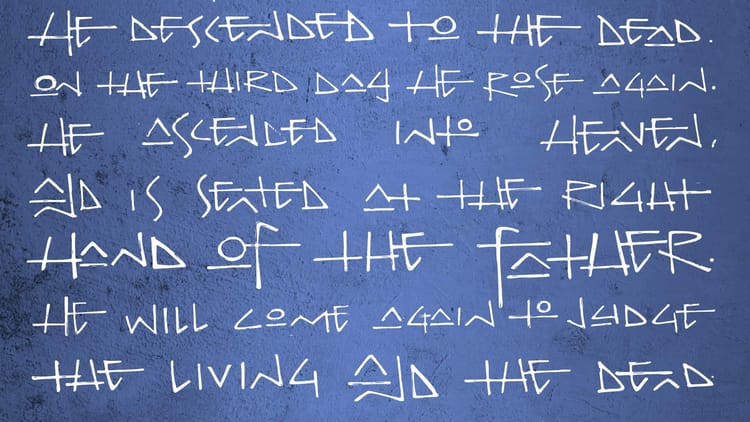About That Check... (Philippians 4:10-23)

Big Idea: Giving generously blesses us spiritually as God meets all our needs.
No matter who you are, I think we have a couple of things in common when it comes to money. First, we don’t have enough of it. I’ve never met a person who thinks they have enough money. If I’m wrong, then make yourself known – some people want to talk to you. For most of us, we wish we had more money so we could do more to make ends meet.
There’s something else we have in common. We believe that money is an intensely personal issue. I remember a few years ago, my wife talked me into having a financial planner come by. I resisted. I didn’t want anybody poking my nose in my money. It was one of our best financial decisions, but we sometimes hesitate to discuss our finances with others.
That means that every time the preacher talks about money in church, we cringe. They can say all they want them to do is help, or they’re just teaching what the Bible says about money, but we don’t buy it. We know it’s not that simple. Preachers have mixed motives, and most of the time we end up feeling either used or guilty. Money’s always been a sensitive topic, especially at church.
Today, we will finish our study of Philippians. One of the main reasons that Paul wrote this letter was to thank the Philippians for the financial gift that they gave him. You got a hint of that in Philippians 1:5, when he thanked them for their partnership with him. This is really the first missionary thank-you letter.
But you’ll notice that Paul hasn’t talked a lot about money. Here we are at the very end of this book, and he’s hardly brought it up. Paul may have sensed some tension. He knew what God taught about those who work in the ministry. “In the same way, the Lord gave orders that those who preach the Good News should be supported by those who benefit from it.” (1 Corinthians 9:14). On the other hand, he knew that some people preached just to make money, just like today. He said, “We are not like those hucksters — and there are many of them — who preach just to make money” (2 Corinthians 2:17). That’s why he was very careful when he talked about money. Paul said, “We are careful to be honorable before the Lord, but we also want everyone else to know we are honorable” (2 Corinthians 8:21).
Paul wanted to thank the Philippians, but he didn’t want to leave them the wrong impression about his motives. As we’re going to see, Paul’s attitude toward money teaches us a lot, not just about money, but the attitude that we can carry in life no matter what circumstances we’re in.
Money and Giving
Let’s read what Paul says as he thanks the Philippians for their gift:
How grateful I am, and how I praise the Lord that you are concerned about me again. I know you have always been concerned for me, but for a while you didn’t have the chance to help me…
As you know, you Philippians were the only ones who gave me financial help when I brought you the Good News and then traveled on from Macedonia. No other church did this. Even when I was in Thessalonica you sent help more than once. I don’t say this because I want a gift from you. What I want is for you to receive a well-earned reward because of your kindness.
At the moment I have all I need - more than I need! I am generously supplied with the gifts you sent me with Epaphroditus. They are a sweet-smelling sacrifice that is acceptable to God and pleases him. (Philippians 4:10,15-18)
Paul’s grateful for their help…sort of. Paul essentially says, “Thanks for the gift, not that I really needed it – but don’t get the wrong idea. I’m grateful!” Paul’s attitude toward the gift is completely different from what we expect.
Question: When we support a ministry, who benefits? We usually think that the ministry benefits. Paul tells us differently. Sure, the ministry benefits. But we benefit more. Here’s the first key from this passage: My financial support of ministry benefits me at least as much as it benefits the ministry. Let’s look at how this works.
God doesn’t need our money. God’s never said, “I only wish I could do this, if only I had the money!” God doesn’t have a resource problem. Sure, God can use us to supply his ministries, but God’s options aren’t limited. Although we usually give to a church or ministry for this reason, God’s purposes don’t require human support.
God has a deeper purpose for our giving. God understands that money isn’t neutral in our lives. There’s a pull in all of us to be controlled by our money. Do you ever get the feeling that you’re not managing your money, but your money is managing you? It doesn’t matter who you are, but your money isn’t just a neutral thing. Jesus said that there’s an inherent spiritual danger in our money. It’ll start to control us, and we’ll begin to serve it. Money isn’t neutral.
I saw this the other night. I’ve wanted a DVD player for ages. Not a fancy one, just a $100 special. Charlene and I agreed that we’d wait until Christmas. Then, the other night, she said, “We have too much junk.” I said, “Yup.” She said, “We don’t really need more stuff.” I saw where this was going, but I said, “Yup.” Then she said, “What if we didn’t buy gifts this Christmas, but instead gave the money to Samaritan’s Purse?” I said, “You mean, besides the DVD player?” I don’t even own a DVD player yet, but it owns me. That’s the way it is with money and possessions. They’re not neutral. They begin to control us.
There’s only one way to counter our stuff’s hold on us. It’s to give it away. It’s the most unnatural thing to do with money. When we give money away, we benefit. It loosens money’s grip on our hearts. There’s something spiritual that happens when we give to support what God is doing, and there’s benefit to us as well as the ministry we support.
Paul puts it this way. “I am looking for what may be credited to your account” (Philippians 4:17 NIV). He uses the picture of money that’s invested and is compounding. “They are a sweet-smelling sacrifice that is acceptable to God and pleases him” (Philippians 4:18). It’s a spiritual act of worship that pleases God. There’s something that happens when we give, and it isn’t all about the ministry we’re supporting. My financial support of ministry benefits me at least as much as it benefits the ministry.
Money and Contentment
That’s why Paul made it clear that he didn’t really rely on their gift. Money wasn’t much of an issue for Paul. Paul wrote:
Not that I was ever in need, for I have learned how to get along happily whether I have much or little. I know how to live on almost nothing or with everything. I have learned the secret of living in every situation, whether it is with a full stomach or empty, with plenty or little. For I can do everything with the help of Christ who gives me the strength I need. But even so, you have done well to share with me in my present difficulty. (Philippians 4:11-14)
This was the part that the Philippians might have misunderstood. Paul wasn’t ungrateful for their financial gift. He did believe that they benefited from giving, but Paul wanted to be clear: he wasn’t relying on their gifts. Here’s the second key: My happiness doesn’t depend on my circumstances. Paul’s happiness wasn’t a product of his financial situation. Paul was content when he was rich, and when he was poor. You don’t need money to be content.
Paul says, “I have learned to get along happily.” Another version says, “I have learned to be content.” Some in Paul’s day believed that contentment – literally, self-sufficiency – was the best personal virtue anyone could have. Paul possessed this attribute, but he didn’t find this attribute in himself, but in Christ. “I can do everything with the help of Christ who gives me strength.” Paul knew contentment even in the worst of circumstances. The Message says, “I’m glad in God, far happier than you would ever guess” (Philippians 4:10).
I got thinking about Paul’s contentment this week. He was in prison, but he didn’t care. He faced possible death, but he was happy. People – other believers – were criticizing him, but it didn’t matter. Paul knew contentment no matter what was going on around him.
The same day I thought about this, I had an unpleasant conversation with somebody. My contentment went out the window pretty quickly. Here’s a man who’s in jail and facing death, and he’s content. Then there’s me – one bad conversation, and I’m done. Paul teaches me that I don’t need to be appreciated or well-off to be content. I can be content no matter what circumstances I face.
The only way I know to apply this is to take time to center daily on what can’t be taken away – my strength and sufficiency in Jesus Christ. We’re all facing different challenges here. Some of us are in tough marriages. We’ve tried, but nothing seems to change. Some of us have health problems. Some may be in rough financial shape. I don’t know what you’re facing, but we’re all facing something. No matter what situation you’re in, you can have contentment. You can be content even in the most unimaginable circumstances of life.
Money and God’s Provision
Paul continues: “And my God will meet all your needs according to his glorious riches in Christ Jesus.” (Philippians 4:19)
There’s the third key: God’s generosity always exceeds my own. You can’t out-give God. As we learn to give, to counter money’s control over our hearts, and as we become less dependent on the amount of money we have and more content, we can remember: God will meet all our needs. He’s more than able to look after me. God is able and willing to meet our needs.
This verse has been abused. Some people think that God is promising material blessing if we follow him. God doesn’t promise that we’ll live rich, comfortable lives. He does promise that he’ll always meet our needs. I’ve heard two stories already today on how God’s been doing this.
Sometimes what God provides isn’t always what we want. Sometimes obedience to God’s will leads to deprivation, even to the point of death. Part of what God provides is the ability to face any circumstance.
Paul, who wrote this passage, was ultimately killed for his faith. We serve a God who sent his own Son to die. Christianity is all about life that comes from death. Jesus asked two of his disciples, “Are you able to drink from the bitter cup of sorrow I am about to drink?” (Matthew 20:22). We will suffer. Paul himself wrote in Philippians, “For you have been given not only the privilege of trusting in Christ but also the privilege of suffering for him” (Philippians 1:29).
I’ve come to realize that there’s a lot in life I can’t control. I can’t control how well the church goes. It may grow, it may flop; I can’t control it. I can’t control what people think of me. I can’t control my health. We can’t control our jobs, our families, pretty well anything.
When you get right down to it, there are only two things we can control: our passion and contentment. We can’t control much, but we, like Paul, can control how passionately we live our commitment to Jesus Christ. We can control our contentment, no matter what circumstances we face.
The Message paraphrase says, “Whatever I have, wherever I am, I can make it through anything in the One who makes me who I am” (Philippians 4:12-13).
This passage is about more than money. It’s about freedom – freedom from being enslaved to money and circumstances; freedom to know that no matter what we’re going through, no matter what we face, we can control two things – our passion and contentment. We can make it, through the One who makes us who we are.
Paul concludes with these words:
Give my greetings to all the Christians there. The brothers who are with me here send you their greetings. And all the other Christians send their greetings, too, especially those who work in Caesar’s palace.
May the grace of the Lord Jesus Christ be with your spirit. (Philippians 4:21-23)
Prayer
First, to give, release what’s holding us – money, whatever else
Second, to experience contentment and passion no matter what we’re going through





